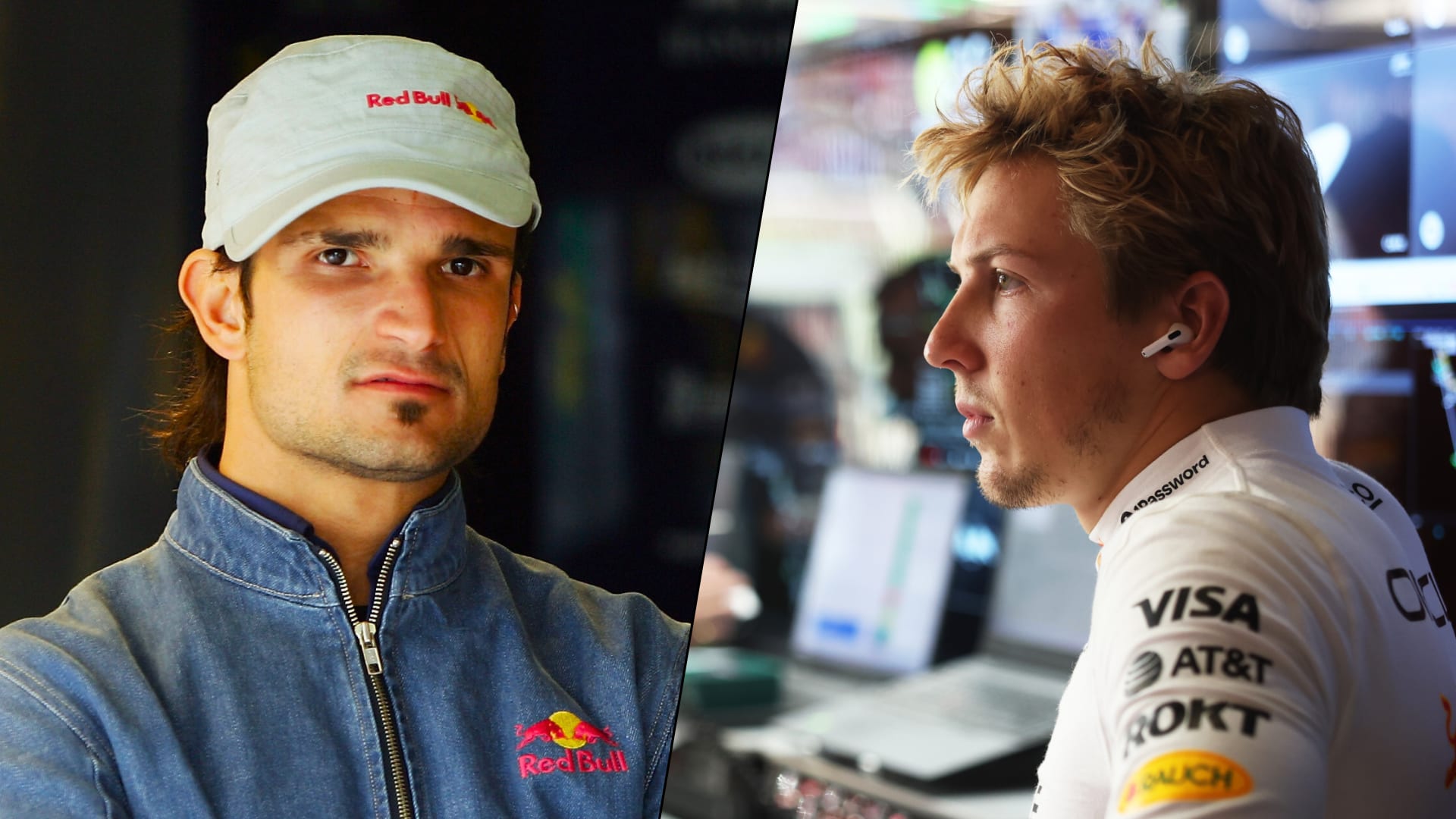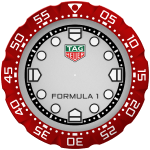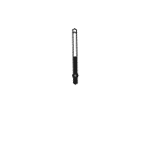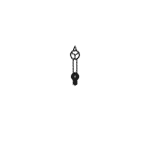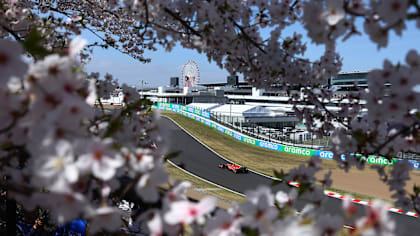)
04 - 06 April
FeatureF1 Unlocked
FULL TRANSCRIPT: Read every word of ex-Minardi owner Paul Stoddart's fascinating Beyond The Grid interview
Share
)
On this week's episode of Formula 1's Beyond The Grid podcast, Tom Clarkson sits down with former Minardi owner Paul Stoddart, who reminisces about the team's day of days at the 2002 Australian Grand Prix – and explains how he came to own the outfit in the first place, and what makes former drivers Mark Webber and Fernando Alonso so special...
Below you can read the full transcript of the episode – or alternatively, listen below in the audio player or head here to catch it on your preferred platform.
Tom Clarkson: Paul, thank you for your time. It's great to have you on the show. Five glorious years in Formula One as owner of Minardi in the 2000s. Can we start by reflecting on your day of days, Melbourne, 2002. How do you reflect on that one?
Paul Stoddart: Well, first of all, it's nice to be talking to you mate. Melbourne... it wasn't just the day, it was the whole week. So that week we were flying our first 747, the other part of the business, the airline was flying its first 747. So we turned up to a brass band red carpet being met by the Premier of Victoria. All the fanfare that goes with it, you know. Our own 747 jet with all the cars on board, including our two seater. And we were the, I suppose, the heroes of Melbourne. I mean, Mark was definitely the hero of Melbourne and this is all the week before the Grand Prix. So we're just expecting to have all the press and all the hype and all the good things that happen when you've got a home town boy and me as the team owner and a home country driver as in Mark Webber.
So we had a lot of fanfare and everything and we're worried about the cars, you know, when knowing that we're going to struggle to get Alex Yoong a second driver to qualify because he's still at 107% rule then. So we have all the build up by the time we get to sort of Saturday, for the serious stuff with qualifying. It's pouring rain in Melbourne, which does happen from time to time. And I remember talking to the track commentator out the front of the Minardi garages after we'd done our first run. And Mark was in 12th and Alex was in, I think 17th, but he was within 107%. And the track commentator said to me, "Paul, I guess you want all these fans to get out there and pray for the sun to come out so you can have another run." I said, "hell no, I want to do a rain dance. I want it to stay how it is because we're safely inside 107%" – and I kid you not all those fans in that stand opposite the main straight literally stood up and did their version of a Mexican wave and the clouds opened up and it poured and that was it.
So we qualified. So I thought, right, we've done our first bit. So the next day, the race and I thought, right, well, we're in. We got both drivers in. And that really mattered because all our money that year was coming from Malaysian government and, having the Malaysian driver not qualify at the first race would not have gone down very well with our sponsor.
So, off we go. Famous accident, cars everywhere. And our two cars get through. And I'm thinking to myself, I can't believe our luck. You know, we might get a you know, if we are really lucky, we might get a top ten finish here with Mark. But not long into the race, about lap three, I find out that Mark has got a terminal differential problem.
It wasn't expected to last more than another five or ten laps. So we got out of the 53 laps we're worrying virtually from lap five that we may find ourselves with a DNF. So anyway, as the race progresses and different other cars pull up, etc, etc, we find ourselves in the closing laps in fifth place – and not just in fifth place, but we had Mika Salo, who's a driver well known to me in the Toyota, which was their first race right behind in sixth and closing on Mark very fast. And we had Yoong believe it or not, in seventh. So Minardi was fifth and seventh. So we expected to lose fifth to Salo and then coming out of turn three unexplainably – and I've seen it and I've spoken to Mika privately over the years – he spun and when he spun he basically spun for no reason. There was just no reason for that Toyota to spin. Anyway, it cemented us getting fifth place and Michael Schumacher, who came to our after party, after all that happened, we just did an impromptu party, said after the podium, Barrichello, Michael and Todd invited me and Mark into the Ferrari garage and Michael said he said, "You know what? For the last three laps" he said, "I thought the race was over. The crowd were on their feet." And he said, "I'm just catching the diamond screen. And they're just focused on you, Mark. You know, nobody cared," he said, "when I won the race, I went up to the podium and yeah, there's hundreds, maybe a thousand people in front of me. I looked left down the pit lane and there were tens of thousands of people down the end with you and Mark."
And of course, in Formula 1 history, not only are they the most, as it was in those days, two points for fifth place, not only is it the most famous two points in the history of Formula 1, but it is the only time there's ever been two podiums in Formula 1. Ron Walker, bless him, came up to me and Mark and said, "come with me, you've got to go up on the podium." Steve Bracks, who was the Premier of Victoria at the time, was up there and they were yelling about doing two podiums. And I'm immediately thinking, hell, we're going to lose our points here. And I'm saying, "Ron, have you cleared this with Max and Bernie?" "Yes, yes, yes, I've cleared it." I said, "Are you sure? Because they can strip as to the points." He said, "yes, I've absolutely cleared it." So Mark and I looking somewhat a little bit nervous, go up on the podium. The crowd is just unbelievable. The now filled the pit line and we've got, I don't know, easy 10,000 people standing out there.
And of course, they've got the champagne up there and they gave us boxing kangaroos, believe it or not, because you couldn't give us trophies and Australian flag and all that good stuff. And then music started and I thought, oh no, please don't play the national anthem. You know, we will be done for this. And to all expat Australians, the old Qantas theme song 'I still call Australia home' is pretty emotional and that's what they played. So you had me and Mark in tears, champagne going everywhere, a very happy Melbourne crowd and still 21 years later, to this day, when I get back to Melbourne each year people say, you remember when you won that race back in 2002?
TC: It felt like a win
PS: It did. And to top that off, it's the only time I've personally driven my two seater around a live race track. So what was organized on that Sunday was that at midday I would go and do three laps with a passenger and so that was all pretty spectacular. But, of course, I remember Charlie Whiting, bless him, saying to me, "Paul, don't you go off, it's too late. We do not have any time to clean the track up. Whatever you do, do not go off." So I did the out lap, I did the flying lap, and on the in lap I started to be stupid and wave to the crowd because they were all going crazy and just coming out of turn three. I'm waving to the crowd and the next thing I'm in the gravel. And I thought, Oh God, if ever there's a God, please get me through this gravel. And I managed to drive through it and come out the other side. I did put stones all over the track, but I'm not responsible for that first Charlie incident.
TC: What did Charlie say?
PS: He didn't speak to me.
TC: Paul, of all of the Melbourne Grands Prix I've been to, that is the one.
PS: That's the moment it's voted... The Melbourne Grand Prix for their 20th anniversary, did a survey of the most fantastic moments in their 20 years, we're number one.
TC: Absolutely. A. the fifth place with Mark Webber. But also, you know, there was the incident at the first corner. The race just had it all. Even the rain the previous day.
PS: Let me tell you something else about that night, right? It was the first race that Murray Walker, the great famous Murray Walker, had not done. And Murray was a good friend of mine. And that particular night I rang Murray from the track at about 9:00 in the evening, just before I was going over to see the marshals to thank them. And so Murray was in tears. He was in floods of tears because he knew what it meant. And that was a great moment. But then we walked across the other side of the track to the marshals tent, where they have their after race party and the marshals that were down there came and spoke to me, two of them, and they said, "you know what? Once those Minardis went through, there was nothing, we ran out of cranes" – and they did. And the marshals carried that last Sauber off the track so they wouldn't put the red flag out. And that's a true story. The marshals carried that Sauber. They ran out of all recovery vehicles they had, and they still had one car in a dangerous position. And they just grabbed the car about 16 of them, apparently. So I've never been able to find it on the tapes, but I believed the story because it was told with such sincerity.
TC: You just had everyone batting for you. You really did. Now, how were the emotions in those closing laps? Because you say the dif problem, you expect it to go at any time.
PS: Well, a lot of people that know me know I'm a horrible chain smoker, but I was pretty good. The only three people I know that used to occasionally sneak a cigarette on the pit wall was Flavio, good old Nicki Lauda and me. And we all really didn't do it very often, like we really didn't. That day there's a lot of shots of me with my head down and luckily you can't see the cigarette smoke. But I was so nervous and I kept having again, sadly we miss him, John Walton, our team manager at the time, and John said to me, "Paul, just calm down. It's not over. It's not over." And I remember those words time and time again. It's not over. It's not over. But when it was over, I mean, it wasn't just me. It was all of the mechanics, everyone. I mean, just balling their eyes out. And another little story that perhaps might be interesting to your listeners: teams like Minardi don't keep cases of Moet Chandon or Veuve Cliquot. We don't have champagne because what for? We're not going to use it. And that day I realized it was literally as we passed the chequered flag that we needed some champagne. And I literally said to our catering staff, go and borrow some champagne. Tom, they didn't have to do that. I still get emotional now. All the other teams were walking down with cases.
TC: It's just really true story. That's fantastic, isn't it? Formula 1 is a family actually, for all of the politics and the behind the scenes bickering that you sometimes hear, it is a family with everybody...
PS: And we knew that probably more than most because obviously and now other guys with the airline we used to fly a lot of the teams, you know. So in 2002 that particular year, we used the 747 to go that fly away races. We used to have Jordan, we used to have some of the McLaren engine boys, we used to have Jaguar, Murray Walker.
TC: Murray Walker of course, who you just mentioned, he used to fly with you.
PS: Yeah, in 2002 until we stopped. But yeah, now we had four or five teams. I mean, I remember some horrendous things that we did on the flights, which I'm not going into...
TS: I came on a few of them.
PS: Yeah, we certainly worked hard and played hard.
TS: Stoddy we are sat in Ledbury in the UK, you know, the HQ of European aviation, your business clearly hugely successful business. I just wanted to ask, given how much you've achieved in your business life, where does that weekend in Melbourne 2002.
PS: No question.
TS: Of everything you've done in your life?
PS: Happiest day in my life. And I've sold businesses for a lot of money, nothing touches that Sunday in March 2002, I was just a... but as I said at the start of this wasn't just the day. The Sunday was obviously fantastic, but it was the whole week before that. I mean, as I mentioned, we had a Malaysian sponsor, so we had Dr.M, the Malaysian Prime Minister. I remember poor old John Prescott, who was the deputy PM of the UK. I remember him having to wait out in the anti room when he was trying to catch a flight back to England because Dr. M, the Prime Minister, was in his Prime Minister's office in K.L. with me on the floor working out what decals to put you know, 'Go Malaysia' all these various decals where to put them on the car and I walked out and I just said to John, I said, "John, I'm really sorry. It wasn't me, it was Dr. M" and things like that. So, I mean, on the way to Australia, we'd come through Malaysia, we pulled up to the VIP terminal, the Prime Minister's terminal, had all the Malaysian press, etc., etc. We even did a run with two seaters around the Twin Towers in K.L. and I had to drive that one.
And I remember in the afternoon we went to the rehearsal and I said, "guys, what are all these white seats with covers on right in line with where I'm supposed to pull up in the two seater?" They said, "Oh, that's where the PM and the cabinet are going to be sitting." And I said, "You've got to be joking. If I have cold tyres, you've got cold brakes and I've got an electronic throttle. If that thing goes open throttle, it won't matter if I stand on the brakes. That's what I'm going to wipe out all the cabinet." And they said "that won't happen, won't it?" But I said, "Well, you better hope it doesn't." I said, "have you got a medivac helicopter and I'd assume something happened with the pilot" and they said, "yeah". I said, "well, I'll tell you what, if something goes wrong, I'm going to be straight in there, kick the pilot out and I'll be in Singapore in 20 minutes." Anyway, obviously nothing went wrong.
TC: Melbourne 2002. You'd owned Minardi for what, 15 months? I think at that time. What did that result do for the team?
PS: Well first of all Minardi that year we had, it's strange how I do remember this but I do, our budget was $28 million. Now to run an entire Formula One team on $28 million and to actually come ninth in the championship because you may recall there was 11 teams that year, but Arrows sadly failed halfway through the season and Toyota, who had spent, because they started the campaign in the middle of 01, and they had spent 1.5 billion USD and we beat them. So probably doesn't need to say much more than that.
TC: Real David and Goliath.
PS: Yeah, it was. I mean, our entire budget for all five years of that wouldn't match the big teams catering budget. Just wouldn't. And you know we had 18 million the first year and I probably put an extra 15 in to get it going. We had 28 million in the second year. Third year with Jos Verstappen and Justin Wilson we were running on a 35 mil budget, fourth year we had a little bit more. We probably were getting into the low forties and we finished in 05 with the same sort of budget, low forties. So you know, for value for money, I think Minardi clinched the title of having the best value for money for every point it ever scored.
TC: Certainly. Tell us, tell us how you came to own Minardi?
PS: Well, that was a story on its own. We're talking about the 15th of December 2000. I'm in Nice looking at buying a boat. I get a phone call from Mike Gascoigne. He says Flavio wants to talk to you. So I talked to Flavio and he says "Paul, you interested in buying a Formula 1 team? We looked at it with Renault engine. It's not going to happen. They're on their knees. You can buy them cheap." So I didn't take much more persuading than that. I literally got on the plane, flew my own plane over to dear old Faenza, Forli airport, which is near Faenza. I went and met with Giancarlo and we did a deal that day. So the biggest asset I bought was Fernando Alonso, who was the test driver and we had no car and we had six weeks and three days to get to Melbourne. And all we had was a wooden mock up with a Renault engine in the back. So very quickly I had to decide how to do this, but also they were very down stuff. A lot of staff had left, so we decided there was only one way we could do this. We had our own Formula 3000 racing team here where the two seaters are now, and I had about 35 staff working, so we banged all the 35 staff in with their overnight bags in the plane, flew to Faenza, beefed up their workforce, I went and quickly did a deal with Bernard Ferguson of Cosworth. He couldn't sell me the engine and he couldn't build the engines. So I bought the rights to the engine and we turned the engines into an engine shop here, took five people from Cosworth and built our own engines. And all this was being done whilst Gunter our first designer that was changing the mock up to a Cosworth engined car.
And we had to build all that and pay suppliers that hadn't been paid and work that was non stop and all the nightmare which you get going into a bankrupt company and get to Melbourne. So the only way we could do all that was use all our resources. And honestly, it's another Minardi record. No one started a Formula 1 team in six weeks and three days. I can promise you that. And when we got to Australia, I come off the pit wall, Fernando had finished 12th. Tarso Marques by the way, his car wasn't built. We only concentrated on Fernando's car and we only had the chance to do one straight line test in Italy before the freight went to Australia. And so we were building Tarso's car physically from the ground up in the pit lane in Melbourne. And so sadly it had an alternater failure and didn't finish the race, but Fernando finished in 12th place and I came off the pit wall thinking, wow, you know, we got here and I walked in and I saw all these people crying in the garage. And I'm sort of looking at them and I'm saying, what are you crying for? You know, we finished. And they are crying from pride. Nobody, nobody thought we could ever do that, but we did.
TC: And did you doubt that you could do it?
PS: Oh, mate, there were times, I mean...
TC: In that six week period...
PS: I'll tell this story, it's a little bit naughty but it's true. We had everybody involved. The pilots were flying us over. We had one plane dedicated to Minardi to just make sure, because we were so tight before the freight left, that to get this shakedown run, we weren't going to make it. We just weren't. And so we were all working like these guys that went over with an overnight bag. They stayed six weeks. They never went home. We didn't have enough hotel rooms. We used to keep people, who had hot rooms. So basically, you once you did 12, 15 hours, you couldn't keep your eyes open anymore, you would go back to the Catalina Hotel and we had a master keys and literally go into a room, kick somebody who'd been there for 10 hours, told them to go back to work and finish what you were doing, and you took the bed. And that was true. We were about six rooms short for the people we had and we just made it work. But anyway, this one night when we had to have two titanium exhaust brackets that were being made up in Nottingham, and if we didn't get them, we couldn't run the car. Just the way that exhaust worked and the way the whole thing worked, we couldn't run the car.
So these two brackets, I was told that they were going to be dispatched at 5pm and it didn't happen. They said 8pm they were supposed to get on the flight from Coventry and it didn't happen. And at that point I had the plane in Forli and I said to the two pilots, they said to me, they said, "do you want us to go back to Coventry? Because these people are clearly going to be late." And I thought about it for a few minutes because it was a fair bit of cost and we were not exactly flush with money. And I said, "yeah, you'd better to do it." So these two guys flew back and they sat at Coventry until 3 am in the morning when those parts turned up, they put them on board. You hand little tiny bag of parts flew back to Forli. I didn't take any notice I was staying there all night and so was Fernando for that matter. You know, Fernando put in plenty of all nighters helping to build the car. And I walked outside the factory and it was thick pea soup fog. I mean, I couldn't see the bloody car. So I thought, no, you know, come on. After all this effort and I knew the plane had gone because it's a two and a half hour flight. So I already knew they were airborne. I thought, I don't know why I'm going to do this, but I'll drive to the airport. I'm too tired to do anything else.
So I drive to the airport and I couldn't see the bloody terminal from the car park. And I just sat there and sat there. And then all of a sudden you hear this absolute roar of the thrust reversers on the BAC 111 and they're on the ground. So I wait for them to come through and we had a fantastic relationship with Forli. Everybody just knew us, looked after us. They come and I said to the captain, who I won't name, I said, "did you see anything?" And of course the F-111 has a what's called a Cat III auto land, which means it lands itself. But legally you've still got to be able to see a little bit. And he said "it's best we don't discuss that. Anyway, here's the parts."
We went back, fitted the parts of the car and ran that day, and that was the only shakedown, that was on the Wednesday, and on Thursday, the freight went. So there was so many stories, not quite as extreme as that, but, you know, last minute things like having to offer suppliers double the money so they do ours in front of somebody else's. And it just went on and on but we did it. And the rest, as they say, is history.
Unlock this exclusive F1 content and more with F1 Unlocked (It's FREE!)
Membership gets you closer with:
- Exclusive, specially curated insider content
- Live the F1 life: Exclusive access & VIP experiences
- Exclusive member benefits, rewards & offers
Already have an account?
Sign InYOU MIGHT ALSO LIKE

Video MUST-SEE: Behind the scenes of how the driving sequences for Apple Original Films' 'F1' movie were shot
News What is the weather forecast for the 2025 Japanese Grand Prix?
Feature BETTING GUIDE: Who are the favourites as F1 heads to Japan?
News Russell admits surprise at pace of Mercedes’ car as he predicts ‘interesting test’ for team in Japan
